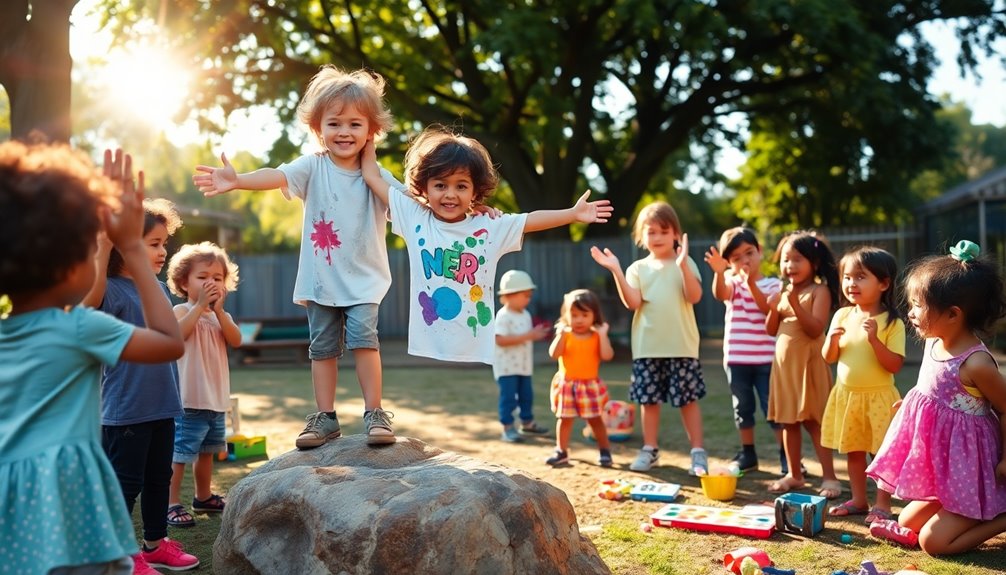Building confidence in children starts with you. Show them it's okay to feel nervous and tackle new tasks with optimism. Normalize mistakes as learning moments and celebrate their efforts. Praise their perseverance to reinforce their belief in their abilities. Encourage them to try new activities, helping them discover passions and resilience. Finally, involve them in setting realistic goals to boost motivation. Keep exploring these ideas to uncover more strategies that can make a real difference!
Key Takeaways
- Model confidence by tackling new tasks with optimism, showing children that challenges are opportunities for growth.
- Normalize mistakes as learning experiences and celebrate efforts, fostering a growth mindset in children.
- Praise perseverance over results to emphasize the importance of hard work and resilience in achieving goals.
- Encourage children to try new activities to build skills, discover passions, and boost their self-confidence.
- Set realistic goals and break them into manageable steps, celebrating small wins to enhance motivation and self-esteem.
Model Confidence Yourself

Confidence is contagious, and your child is likely to pick up on your attitudes and behaviors. By modeling confidence yourself, you help your child understand that self-belief is essential for success.
When you tackle new tasks with optimism, you're not just building confidence in yourself; you're teaching kids that challenges can be embraced outside their comfort zone. Acknowledge your own nerves without letting them control you. This shows your child that feeling anxious is normal and manageable.
By demonstrating a growth mindset, highlighting your positive actions, and learning from mistakes, you empower your child to adopt similar approaches. Additionally, understanding that brain fog can impact focus and clarity will help you address challenges more effectively, setting a positive example for your child.
Embrace Imperfection

Modeling confidence sets a strong foundation, but it's equally important to teach your child that imperfection is a part of life. Encourage them to embrace imperfection by normalizing mistakes as learning opportunities. This fosters resilience and self-acceptance, helping them understand that aiming for unattainable perfection can lead to unnecessary anxiety. It's vital to remember that emotional intelligence plays a crucial role in developing a child's self-confidence.
| Aspect | Impact on Confidence | Encouragement Strategy |
|---|---|---|
| Mistakes | Teaches growth and learning | Celebrate efforts, not just results |
| Acceptance | Reduces pressure to conform | Share your own flaws openly |
| Resilience | Equips them to face challenges | Discuss overcoming setbacks |
| Self-acceptance | Promotes emotional well-being | Model self-love and forgiveness |
Praise Perseverance

When children hear praise for their perseverance, they learn that effort counts more than just the end result. By celebrating their persistence, you help build confidence and instill a growth mindset.
Research shows that when you encourage your child's hard work, they develop higher self-esteem and become more willing to tackle challenges. Recognizing their efforts reinforces their belief in their abilities, motivating them for future endeavors. This approach also diminishes their fear of failure, as they start to associate hard work with success. If you want to help your child thrive, make it a habit to praise perseverance.
Moreover, engaging in transformative practices can further enhance their confidence and resilience during challenging situations.
Encourage Them to Try New Things

Encouraging your child to try new things not only expands their skills but also builds a sense of capability and confidence. When you support them in exploring diverse activities, they discover their passions and develop a stronger identity, which is essential for self-esteem.
This exploration helps your child become more resilient and adaptable, important life skills for facing challenges ahead. Furthermore, trying new things can lead to improved social interactions, fostering friendships and support networks.
Your involvement is key; by encouraging your child and providing positive reinforcement, you reduce anxiety and empower them to embrace challenges. Ultimately, helping them step outside their comfort zone creates a sense of achievement, leaving them feeling good about themselves and their abilities. Additionally, incorporating mindfulness techniques can enhance their ability to manage stress and embrace new experiences with confidence.
Set Goals

Setting goals is a powerful way to give your child a sense of direction and purpose in their endeavors. By helping kids articulate their aspirations, you create a clear path for their efforts.
Break larger goals into smaller, manageable steps; this makes the journey less overwhelming and allows your child to experience small wins, boosting their confidence. Celebrate every progress and acknowledge achievements, no matter how small, to reinforce their belief in their abilities.
Involving kids in the goal-setting process fosters ownership, increasing their motivation and self-advocacy. Teach them to set realistic and achievable goals, which helps them learn to manage challenges and develop resilience. Additionally, consider incorporating techniques from various sleep training methods to ensure that they are well-rested and ready to pursue their dreams.
With your support, they'll gain the confidence to pursue their dreams.
Frequently Asked Questions
How Do I Increase My Child's Confidence Level?
To increase your child's confidence level, encourage them to set realistic, achievable goals.
Celebrate their efforts, not just the outcomes, to reinforce hard work.
Introduce new activities to help them explore and develop skills.
Teach them that mistakes are part of learning, fostering a growth mindset.
Ultimately, model positive self-talk and behaviors; your confidence in facing challenges will inspire them to adopt a similar attitude.
Your support makes a big difference!
What Causes Lack of Confidence in a Child?
A lack of confidence in a child often stems from negative self-talk and the pressure of parental expectations.
When children internalize criticism or feel they must achieve to be valued, their self-worth can diminish.
Sensitive kids might also struggle with emotional overload, leading to anxiety.
Comparisons with peers, particularly in competitive settings, can foster feelings of inadequacy, while a fear of mistakes can create perfectionism, further hindering their willingness to explore new challenges.
How Do You Help a Child With No Confidence?
To help a child with no confidence, start by encouraging a growth mindset. Remind them that mistakes are part of learning.
Set realistic goals together and break them into smaller steps, celebrating each small success. Praise their effort and persistence instead of just the outcomes.
Offer safe chances for exploration and trying new things, and validate their feelings, allowing them to express emotions while reassuring them that uncertainty is normal.
What Experiences May Damage a Child's Self-Esteem?
Imagine a bright flower wilting under harsh sunlight—this is what negative experiences can do to a child's self-esteem.
Constant criticism from parents or teachers can make them feel inadequate, while bullying can leave deep emotional scars.
When perfectionism is emphasized, fear of failure replaces the joy of trying new things.
Comparing them to peers fosters feelings of inferiority, and invalidating their emotions can strip away their self-acceptance, leaving them struggling to bloom.
Conclusion
Building confidence in children is like giving them a superhero cape; it empowers them to take on the world! By modeling confidence, embracing imperfections, and praising their efforts, you're laying a strong foundation. Encourage them to try new things and set achievable goals, showing them that it's okay to stumble along the way. Remember, every little victory counts, and with your support, they'll grow into the fearless adventurers of tomorrow, ready to conquer any challenge!









